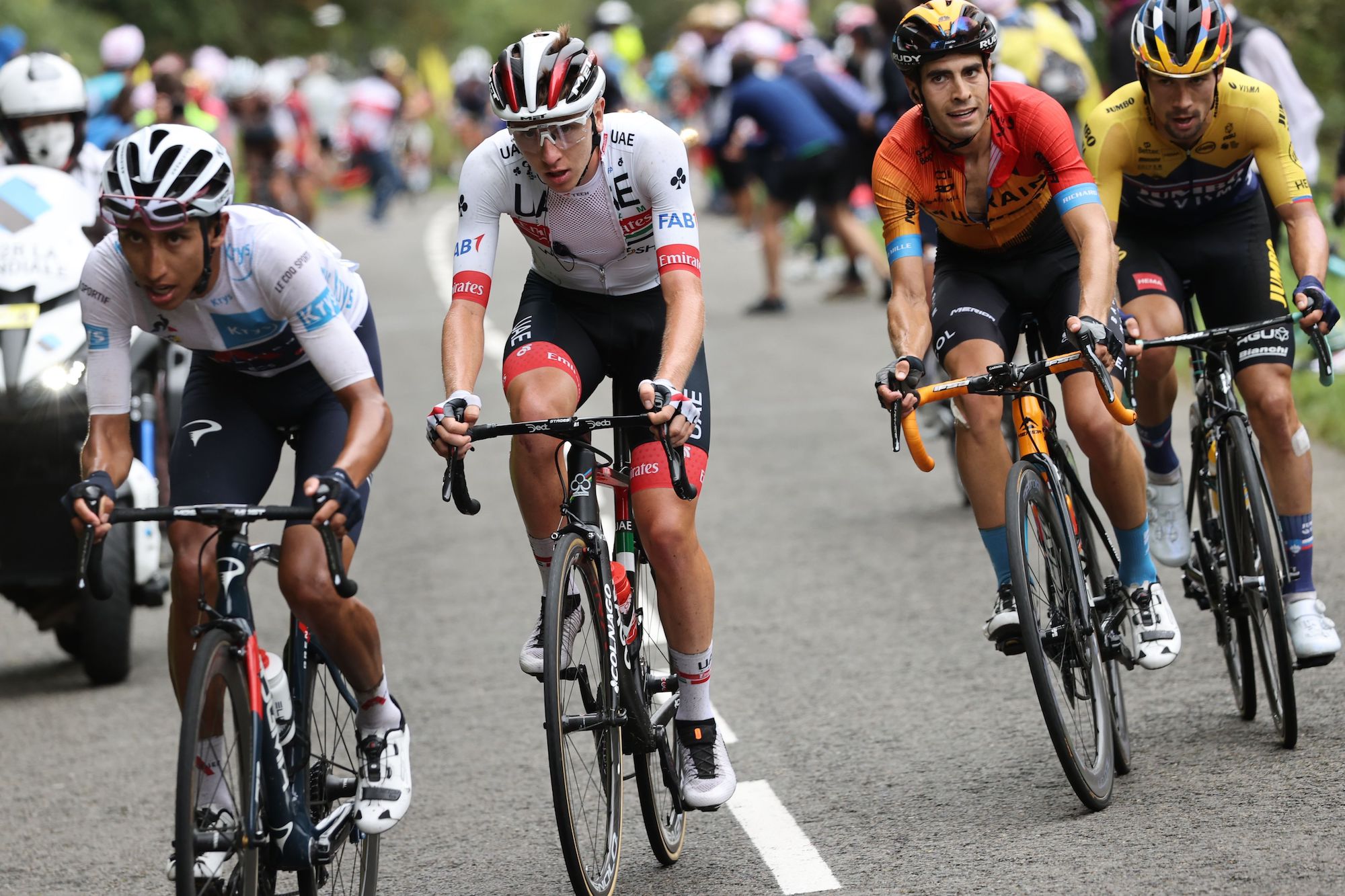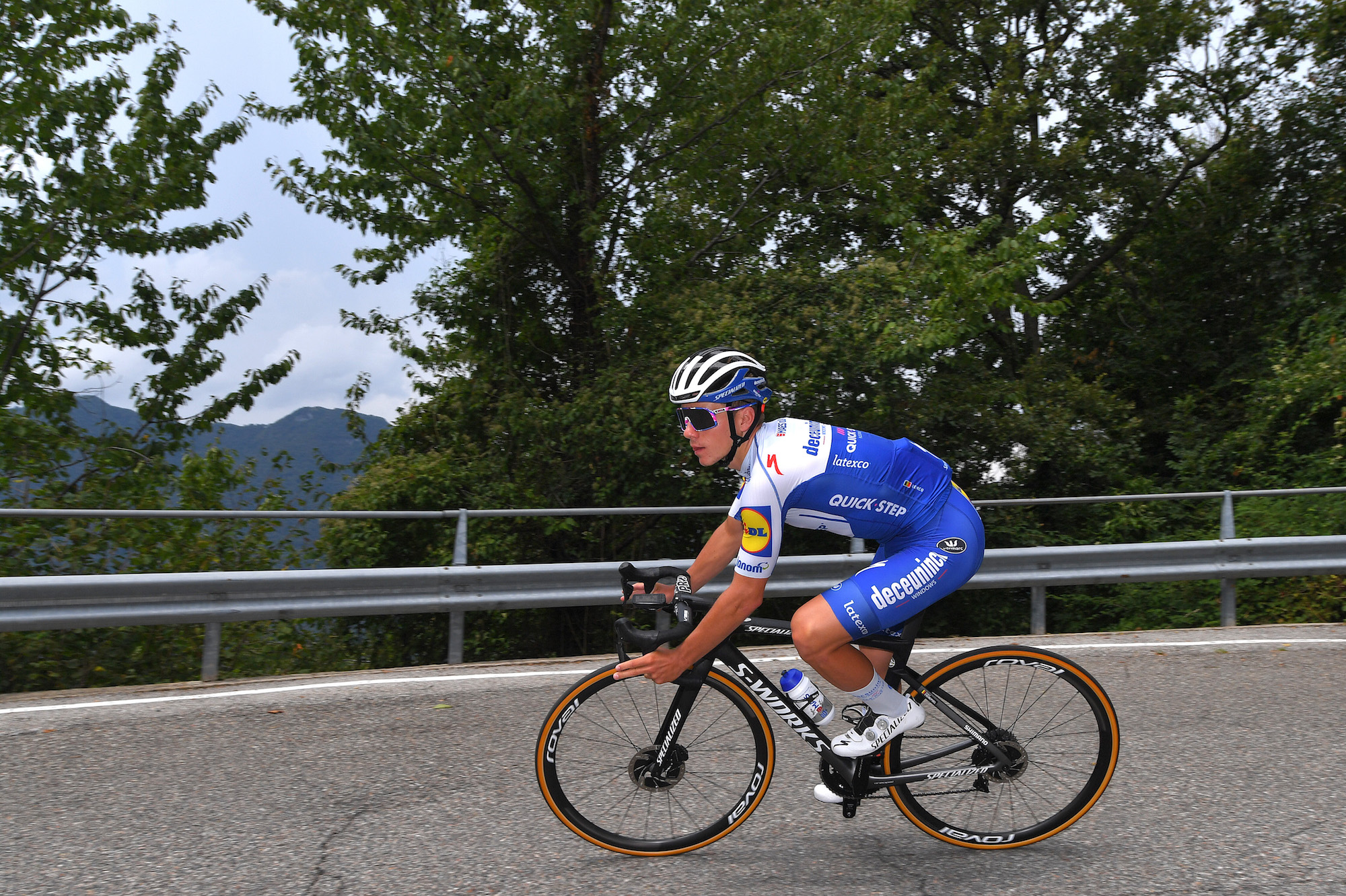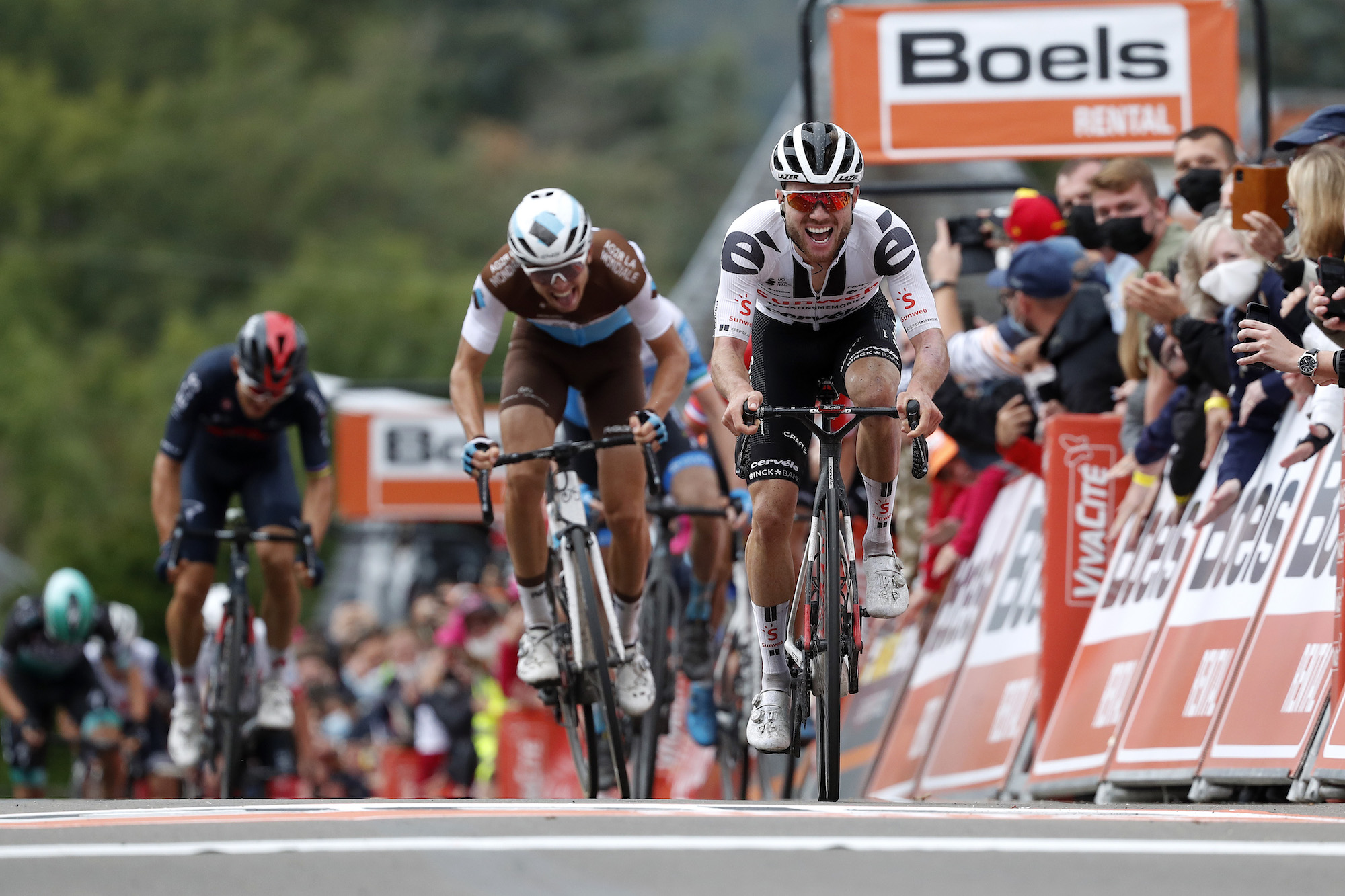How generation Z are taking over the cycling world
How are fresh-faced riders barely out of their teens managing to win at the highest level? Aspiring pro Joe Laverick has a personal investment in finding out

(Kenzo Tribouillard/AFP via Getty Images)
The latest race content, interviews, features, reviews and expert buying guides, direct to your inbox!
You are now subscribed
Your newsletter sign-up was successful
Generation Z – riders born in the late-1990s and early-2000s – are taking over the cycling world. Tadej Pogačar, Remco Evenepoel, Egan Bernal, Marc Hirschi, the list goes on. When Bernal, aged 22 years and 196 days, crossed the line in the maillot jaune last July, he was the youngest winner of the Tour de France for over a century. A little over a year later, Pogačar trumped the Colombian by clinching victory a day before his 22nd birthday. How are riders who’ve barely started shaving managing to win the biggest bike races in the world? And do we need to tear up what we thought we understood about youth training and development?
To put this into context, the average age of a Tour de France winner is 28.5 years old. As a 19-year-old aspiring professional cyclist, that seems about right to me: I’d like to think I’m going to carry on improving for at least another five or six years. How could I be expected to be approaching my peak already? Even away from endurance sports, performance tends to peak in the mid to late-20s – just consider the football maxim, “You can’t win anything with kids”. Until recently, this was true in cycling. But riders are no longer entering the pro peloton as bottle boys and working their way up; instead they’re entering the pro peloton as Grand Tour contenders. What’s changed all of a sudden?
Is our sport going through a scientific revolution, where data obsessive youngsters are training like pros from a much earlier stage than before? I’m talking about my generation – I’ve raced all over Europe pursuing cycling excellence. Is my generation different to those before us?
A string of good results in the junior ranks can now result in a pro contract, largely thanks to a certain Remco Evenepoel. Pre-Remco, junior results were largely ignored or forgotten – you had to be patient and earn your stripes. It’s a whole new ballgame now. With this changing landscape and the opportunity to go straight into the WorldTour as a teenager, riders are training more seriously from an earlier age. It’s not unusual to see a junior with a £5,000 bike and a £250 per month coaching plan.
Is it possible in 2020 to be at the top of the sport without a scientific approach? In my opinion, the answer is a firm no. You just cannot do it. With more and more riders becoming science-driven from ever-younger ages, neglecting science is like demoting yourself to the bottom of the class. James Spragg, sports scientist and co-author of Optimal Talent Development in Cycling, prefers the analogy “like playing checkers while everyone else is playing chess”.
>>> Subscriptions deals for Cycling Weekly magazine
Youth coaches discourage power meters until at least the junior ranks but the days of relying on chain gangs to dictate your training effort are numbered. Ambitious juniors have sports scientists, nutrition plans and access to the latest technology. Development is happening quicker and sooner.
The latest race content, interviews, features, reviews and expert buying guides, direct to your inbox!
I decided to speak with 15-year-old Alex Beldon, a multiple national youth champion with a 10-mile PB of 20:12, and one of the most promising Yorkshire cyclists of his age. “School and life skills come first,” he tells me, speaking with a maturity beyond his years. The teenager describes his training schedule, devised by his time triallist dad Simon, as 60 per cent data-driven sessions, the rest simply “going out and riding with my mates, doing what I want.”
Beldon is evidently not at all a slave to the numbers. “I’d quickly lose motivation if I had to follow a plan to the letter,” he says. There is no sign of excessive specialisation; he competes in a range of disciplines, enjoys sociable training with mates, rides in pacelines and attends British Cycling’s development sessions, which focus on skills rather than data.

What matters more in the junior rank, bike-handling skills or FTP? “It’s probably FTP, if I’m honest,” says Beldon – whose own FTP is well over 5w/kg – confirming that, at 15, riders are already comparing their data to that of the pros.
There are different approaches to development. While some coaches are still old-school, reports of Italian teams banning power meters are becoming a thing of the past. That said, I know from my own experience that some French amateur teams still discourage riding the road bike until January, favouring skiing or hiking.
Talent identification strategies are changing too. Marco van Bon – Spragg’s co-author – coaches some of the brightest Dutch stars. He tells me that the Dutch Cycling Federation has widened its net when searching for talent – no longer simply selecting the most promising guys at the earliest age. “We used to have a team of eight riders, those who performed best coming through the age categories. Now we look at around 50 riders at once.” These days the selectors make allowances for riders developing at a slower rate. “We picked up some small guys who are less prominent in national races — when you’re 60kg, it’s hard to perform in crosswinds along the dyke.”
Van Bon is a sports scientist but he reiterates the importance for juniors to learn about their body by using the rate of perceived exertion (RPE). Although young riders can improve their FTP by as much as “60 watts in a single year”, he doesn’t want them fixating on the numbers. Van Bon also worries that juniors are training like pros too early: “If you’re doing 30-hour weeks as a junior,” he asks, “what do you do as a pro to progress?”
Each national federation now has historical data allowing it to look back and review what it has taken a rider to go pro. British Cycling can use Tom Pidcock’s data to compare its current crop of riders. This is the same across the world – pity the 18-year-old Slovenians being compared to where Pogačar was at the same point.
When Quinn Simmons won the junior world road title in 2019, he reportedly pushed a normalised power (NP) of 419w (5.8w/kg) for 49:56. The year before, I won a TT stage in a junior UCI race by sustaining NP of 387w (5.95w/kg) for 15:15. What does that difference mean? Simmons went straight to the WorldTour while I went to a Continental team.
Following the release of Simmons’s numbers, I remember WhatsApp chats with fellow U23s – we joked that his power meter needed calibrating. We couldn’t fathom that somebody younger than us could pump out that much power – not just WorldTour numbers but world-beating numbers.
It’s often said that you need to be capable of (at least) 5.7w/kg for 30 minutes to complete the Tour de France. Pogačar is perhaps stretching this envelope; he averaged 6.5w/kg (429w) for nearly 25 minutes climbing the Col de Peyresourde on stage eight of this year’s Tour. Power is only part of the story, though. Countless riders have good raw numbers these days, but not all have the bike-handling skills to match. It’s great being powerful on paper, but it takes a lot more than raw power to finish the Tour de France.
Bear in mind too that when Pogačar dominated the stage 20 time trial to win the Tour, he did so without using a power meter. It’s almost ironic: Generation Z has grown up with more data points than you can shake a stick at, but we’re also the generation reverting back to the old style of racing. The top young riders are winning with panache. It’s not just Pogačar – Evenepoel is never scared to attack at 80km to go, and Hirschi launched dreamy long-range Tour de France attacks. Even Ineos are getting in on the act: when Geoghegan Hart pulled on the maglia rosa at the end of the Giro d’Italia in Milan, Sir Dave Brailsford hailed it as the start of a new era: “We’ve won a lot doing that [defensive style of racing], but it’s not as much fun…we’re Grenadiers now.”
Is racing without power meters really becoming a trend among younger riders? Are they relying on alternative means of effort judgement?
“No rider in the world rides to a set power. There’s too many variables, it’s impossible,” says Spragg. “Every rider has a feedback loop – they know how it feels to do 6w/kg fresh on a training camp. In a race, it doesn’t matter if they’re only doing 5.8w/kg – it’s at that same level of perceived exertion; they know everyone around them will be suffering.”
We can’t talk about unprecedented performances without pondering the dark history of our sport. At what point does a young rider’s data begin to stretch credibility? In my personal opinion, we’re not at that point yet. Historically, riders began doping in desperation upon realising how hard it was to reach the top. It was a case of ‘dope or go home’. A young rider who is winning within a year or two or turning pro has no such motivation of last resort. Does a greater focus on data increase the temptation to manipulate? Possibly, but not inevitably; there are good grounds for hoping that Generation Z is the cleanest in decades.
It’s 2020, so of course there’s a Covid factor in this discussion. The bizarre race calendar may have assisted younger riders in coming to the fore more than in a normal season. Wout van Aert isn’t quite Generation Z, but he’s relatively new to the road scene. Traditionally, riders have structured build-ups to their targets – altitude camps, preparatory races, etc – but Covid threw such planning down the metaphorical toilet. Those used to following the traditional path have struggled, while younger riders have grasped the opportunity.
It will be interesting to judge at the end of the 2021 season. The human body hasn’t suddenly evolved; rider physiology remains the same. Will hotshot youngsters be as successful when the older guys have their usual preparation?
Has a golden new generation thrust itself to the fore, or has a power vacuum effectively pulled them through? The sprinting scene is healthier than ever; Mark Cavendish’s success has been replaced by Caleb Ewan, Sam Bennett and Arnaud Démare. On the GC side, arguably there have been gaps to fill. Chris Froome dominated the sport for a decade and no one a few years younger has emerged to fill his winner’s jerseys. Nairo Quintana and Tom Dumoulin, once predicted to become GC superstars, though great riders, have not lived up to the hype. As we reach the end of the Froome era, there’s a Game of Thrones-style battle for the top spot. If there is no candidate in their mid-20s, Generation Z is set to pounce.

We can’t possibly ignore the impact of social media on rider development, both on and off the bike. Great Britain U23 coach Ben Greenwood thinks social media is one of the biggest changes in recent years.
>>> Cycling Weekly is available on your Smart phone, tablet and desktop
“Before, riders would go pro and then be drip-fed new information over three or four seasons. Nowadays, all of this can be dumped on a rider at a young age via the internet – they can get years of experience at once.”
By using Strava, young riders can learn about pro training demands. Instagram allows a behind-the-scenes look into the lifestyle of a pro, and YouTube is an amazing resource. Generation Z has an army of fans motivating them from their back pocket – the downside being that, when that online support isn’t forthcoming or even turns negative, the mental health effects can be serious. They’re the first to grow up with social media, and we’re starting to see its impact in the pro peloton.
The internet demands off-the-cuff content, but never forgets. Kids make mistakes, and where social media are concerned, mistakes can be costly. Simmons was recently suspended by his team for a tweet widely interpreted as racially charged. It’s a perfect example of the hazards. Cycling teams are funded by sponsors to promote their brands. An ill-considered tweet could be enough to sever funding streams.
Maintaining the right social media image is just one pressure among many. The stakes have never been higher for top-performing young riders, and the mental health risks are palpable. There are so many questions that only time can answer. Will this new generation burn out and retire earlier? Will we miss late-developers by focusing too much on young riders? If you win a Grand Tour at 22 and get the bumper contract that comes with it, how will you adapt as your performance declines?
Not every young cyclist who steps up to the pro ranks will become a world-beater. We can’t all win Grand Tours before we’re 25. The peloton will always need workers, but with the amount of talent on offer nowadays, in an already fragile market – keeping your job in the WorldTour has never been harder.
As a young rider myself, I recognise that it’s going to be difficult to make it. Pro cycling is a cutthroat sport. I’m not yet a pro cyclist by title or salary, but I live and train as if I am. Is it demoralising seeing guys a couple of years older than me winning the biggest races? No. I know that everyone has a different development curve, and I’m happy biding my time. If anything, it’s inspiring.
This feature originally appeared in the print edition of Cycling Weekly, on sale in newsagents and supermarkets, priced £3.25.
Founded in 1891, Cycling Weekly and its team of expert journalists brings cyclists in-depth reviews, extensive coverage of both professional and domestic racing, as well as fitness advice and 'brew a cuppa and put your feet up' features. Cycling Weekly serves its audience across a range of platforms, from good old-fashioned print to online journalism, and video.